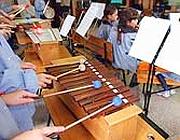February 22, 2010
 SAN DIEGO (California) – Music hour at school? Important as that of Italian, history or geography. Or perhaps more important, neuroscientists say. Because listening to Beethoven, learning to play an instrument, or to sing a song has an important influence on the sensory and cognitive development of children and youths. And it could also constitute a good system for caring for persons with disturbances of language like dyslectics or even autistics. Music and the perception of language, in fact, has something to do with both the nervous system and with the highest cognitive centers of the brain.
SAN DIEGO (California) – Music hour at school? Important as that of Italian, history or geography. Or perhaps more important, neuroscientists say. Because listening to Beethoven, learning to play an instrument, or to sing a song has an important influence on the sensory and cognitive development of children and youths. And it could also constitute a good system for caring for persons with disturbances of language like dyslectics or even autistics. Music and the perception of language, in fact, has something to do with both the nervous system and with the highest cognitive centers of the brain.
NOISY CLASSES – «The musical experience – says Nina Kraus, originally from Trieste, now a professor and researcher at Northwestern University of Evanston, Illinois, on the occasion of the annual meeting of the AAAS (the American Association for Advancement of Science) taking place in San Diego – can help one who speaks also in a noisy environment to hear better because it allows the isolating of sound: we have evaluated this capacity by studying the brain of musicians. Let us think about one who plays in an orchestra, for example: each musician must be able to collect key signals which then give him permission to “enter” at the right moment». The research of Nina Kraus has demonstrated that the nervous system responds to acoustic stimulus of the language (that is, to whom one is speaking) and to musical stimulus (a song for example) immediately, in the space of milliseconds. Musicians do it faster than others.
DYSLEXIA – «Not only this – adds the researcher – we have also shown the musical experience allows others to hear with more attention interpreting with greater facility the nuances of the language tied to changes (even slight) of the intonation of the voice of the speaker». Because of this children instructed in music can maintain concentration more easily and listen better to the voice of the teacher in a noisy classroom. Because of this persons with problems with language, like in fact the dyslexics o even autistics, would be able to helped by music. «Now we know that music – Nina Kraus concludes – can mould the subcortical sensory circuits in such a manner as to improve daily attivities like reading or listening to others».
Adriana Bazzi
abazzi@corriere.it